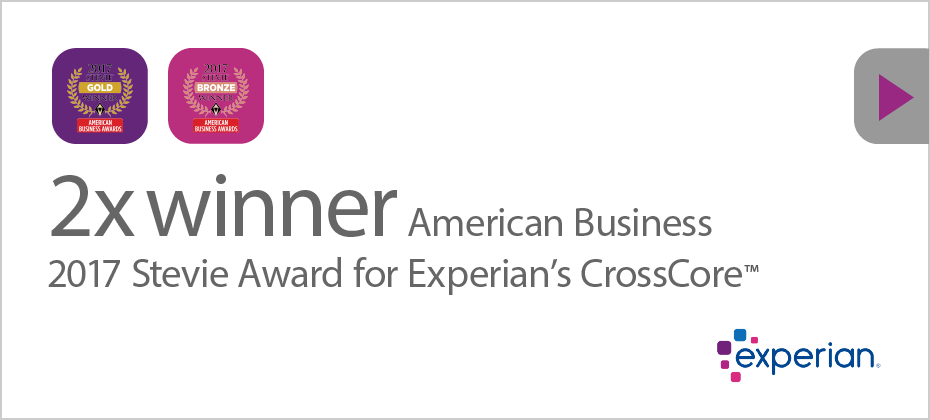Tech & Innovation

At Experian, we are continually innovating and using technology to find solutions to global issues, modernize the financial services industry and increase financial access for all.
Financial Empowerment

Our deep commitment to social and financial inclusion is reflected in our workplace culture, our partnerships and our efforts to break down the barriers to financial equity.
Financial Health

Our initiatives are dedicated to getting tools, resources and information to underserved communities so that consumers can best understand and improve their financial health.
Latest Posts:

"If you’re taking an emergency call (999 in the U.K.), it’s easy to spell a name wrong. And sometimes people reporting a crime won’t give you their name at all. So, after 13 years, we’d collected thousands of duplicate or incorrect records. That might seem trivial, but linking data with the right person can be crucial to a case. You might speak to a vulnerable person and miss that they’re a repeat victim of crime. The bottom line is that, to keep people safe, we needed better data. I asked Jon (at Experian) if he could help. He certainly could. I applied for Home Office funding for the project and, after three nerve-wracking months, we actually won it. Then it was, ‘Alright, how’s this going to work?’. Experian set up a system for us called Pandora. It took our data, cleansed it using Experian data – filling in gaps, adding data streams so that, using our own matching criteria, we managed to merge thousands of records. The result was data that’s as clean and accurate as we could possibly get it. We call it our Golden Nominal database — and the difference is phenomenal. Now, incoming calls prompt one or two records instead of hundreds, giving us a clear view of the caller. If someone’s calling about domestic violence, we’ll see whether they’re a repeat victim, and get them help fast. And frontline officers can run instant checks on a suspect from a phone, seeing how big a risk they pose and whether to call for support. We’ve got a way to go, but we’re already creating a thousand fewer records a week. And it’s all down to Experian’s work behind the scenes. It’s delivering exactly what we wanted."

Health care can be expensive and unaffordable for many Americans. By developing a financial assistance screening tool and raising hospital donations through local charities, Experian makes sure those in need have financial support to put their health first. For many Americans, health care costs can be brutal. Insurance may not cover enough for some people, resulting in expensive out-of-pocket costs. Others may not even have insurance, forcing them to shoulder massive bills they can’t afford to pay. A few years ago, Experian created a financial assistance screening tool that helps patients quickly find out if they are eligible for financial support by asking a few questions about income and household size. We are proud that we get to say to many low-income patients, “Don't worry about your bill, it's going to be covered – just focus on getting better.” But while it’s wonderful to witness the relief on people’s faces when they find out their medical expenses are covered, we also noticed that many individuals with a moderate income were unable to pay for unexpected medical expenses, even with this screening tool. The financial burden of a sudden health issue could tip their family budget over the edge, leading them to default on credit cards, struggle to pay rent or their mortgage, or even get pushed into bankruptcy. They’re not poor enough to get financial support, but they’re not rich enough to pay for all out-of-pocket expenses, so they fall through the cracks. Unsatisfied with this reality, my team and I created a way to help middle-income families in need, using both the Experian Health Care financial assistance screening tool and the support of generous donors. We ask third-party donors, such as charities and companies – and our fellow Experian employees – to help us assist patients who are struggling to pay their bills. Their donations help create a fund for hospitals that can cover for these types of emergencies. When hospitals run Experian’s screening tool and identify a patient struggling to pay their medical bills, we can tell the patient they're covered. Rather than worrying over bills, they can focus on what truly matters – their health. It's really exciting to take an Experian product that already works for those in need, and use it to help even more patients. Right now, there are more than 700 hospitals using our screening tool. It blows my mind to think about how many more millions of patients this donation fund will help each year.

Five years ago, I began volunteering as an Experian Ambassador, teaching personal finance to local high school students. It is so rewarding to share my credit knowledge with young people, and to see their eyes light up when they understand how credit works. I ended up starting my career at Experian 26 years ago because my passion for credit runs in my blood. I was raised in a household where reputation was everything to my father. The idea of having a good name, a good reputation and a good credit score was drilled into me. So, when Experian created the Ambassador Program to promote financial literacy in local communities through employee volunteers, I jumped at the chance to participate. At the time, I was an Account Executive and knew that for most consumers, credit is an obscure subject. I thought this program would be a great opportunity to apply my expertise and educate people in my community about the importance of taking their financial reputation seriously. As an Ambassador, I gave my first presentation on financial literacy to high school students, and the experience was so rewarding that I immediately contacted my son’s high school to see if I could teach the same class to his classmates. The program has grown to where I now go to the school twice a year, teaching the entire student body of 4,000 students about how they can responsibly build their credit. For each class, I share personal stories and anecdotal examples that are relatable to them. For example, to explain how credit scores affect consumers, I ask every student to think of number between 350 and 800. I then pick three volunteers to come to the stage – one who chose a number in the low range, one from the mid-range and third from the higher range. I then ask those three kids to agree on the dream car they would buy. Once they agree on the make and model, we talk about how the price of the car is the same for everyone, but that their credit score determines the loan financing. Someone with a higher credit score will pay much less over the life of a car loan than someone with a lower score. That’s the moment my students’ eyes light up, because they finally understand how credit works. Over the years, I’ve had kids come up to me in grocery stores and thank me for teaching them about credit. One young man in particular came up to me at a local farmer’s market, beaming. “I remember when you taught me about credit scores,” he said. “Because of you, I was able to save money, get a secured card, build my credit and buy my first car.” His pride was infectious. Credit has an impact in everyone’s life at some point. By speaking to students at a young age, in terms and language they understand, I’ve helped countless students successfully and safely build credit to help them reach their first financial milestones. I am proud of the opportunity I have been given at Experian to help young people to take control of their financial futures.

I’m constantly amazed at how Experian gets to uncover and bring to life the data that really matters. By partnering with the National Literacy Trust to analyze different data sets, we uncovered a widespread literacy crisis in England. A while back, Experian was approached by the National Literacy Trust in England, asking us to collect information to help them better understand how far-reaching literacy problems are in England. Using data from Experian, the National Literacy Trust and the 2011 census, our data analytics team compared data sets against social factors that are closely associated with low literacy levels, such as education, income and unemployment rates. Through this in-depth analysis, we were able to create a literacy vulnerability score for every single electoral ward and parliamentary constituency in England. We found that 86 percent of all English constituencies have entrenched problems with literacy. What was most surprising was how far-reaching the problem was across the country. I guess I had assumed, as most would, that in the more affluent areas where there are good levels of education, higher incomes and higher employment rates, children would have a good relationship with books. We found, however, that it doesn’t matter what community you live in, or how affluent or deprived the area is – literacy issues can affect all of us. While the initial reaction by the public has been one of shock, I really think this study was something England needed to help the next generation avoid the same problems. Working alongside the National Literacy Trust, we’re leveraging this data to raise awareness within the government. Early in February 2017, we supported an event for Members of Parliament (MPs) to highlight how the issue may affect their constituencies, using a ranking table that shows which areas are the most affected. You could say this literacy issue is a bit of a crisis, and MPs would now agree. In my role at Experian, I frequently look at what we call “societal impact stories” that highlight how Experian is engaged in local communities. What I love about my job is getting to see how all the powerful information we have on hand is being used to lay the foundations for others to transform lives and local communities for the better. While there is still much work to be done to solve the literacy issue in England, I’m constantly amazed at how we at Experian get to uncover and bring to life the data that really matters.

Bernard Marr, who LinkedIn recently ranked as one of the top 10 business influencers in the world (just behind Bill Gates and Richard Branson), recently published a story on Forbes about how Experian is using machine learning to cut mortgage application times to just a few days. In this article, Experian’s Global CIO, Barry Libenson, discusses how Experian is well-positioned to pioneer technology in this field, due to the fact that banks, insurers and public sector bodies all routinely come to it for its data. “Now the large financial institutions don’t want you to dictate to them how they consume information, they want to tell you how they want to consume it, and you have to deliver it to them in that way. So they can say ‘hey, Experian, we have a simple question we want to ask and we expect a simple response, and we want it in real-time, and we want to be able to get it 24 hours a day from anywhere in the world.'” Check out the full article: How Experian Is Using Big Data and Machine Learning to Cut Mortgage Applicatoin Times To a Few Days

We developed CrossCore to make the industry’s fraud and identity solutions work better for everyone. We wanted to help organizations prevent more fraud while making it easier for their good customers to do business with them and nearly a year after the launch we’re proud of the reception we’ve had from clients, partners and the industry. Our latest honor is a bronze and gold medal from the American Business Awards for Identity and Access Security Solution Product of the Year and Product Management Department/Team of the Year. “We developed CrossCore to help our clients get the strength they want with the flexibility they need for more effective fraud management,” said Kathleen Peters, Global Vice President, Product Management, Fraud and Identity at Experian. “These latest Stevie Awards validate the feedback we’ve received from the market, and more importantly, from our clients.” CrossCore helps organizations with the ever-changing, complex and challenging world of fraud prevention. Businesses readily add solutions from us, other providers, and even their own solutions, to connect, access and orchestrate decisions across multiple systems. To make this possible for our clients, our teams worked around the clock in offices all around the world. They brought experiences and perspectives together to build and test code in packages that could be installed anywhere and everywhere. Using this “immutable infrastructure” approach, the team built, configured, connected, tested and monitored over 20 different systems to ensure everything was working. And they did it in less than nine months. The Stevie Award judges recognize the efforts of this team and the power of CrossCore. Here are just some of the positive comments we received: “The deployment of a global project such as CrossCore in only 9 months is remarkable, especially with 20 different systems being interconnected to deliver the service. Lots of hard work from the team, congrats!” “Seems like the strongest and the best solution in fraud prevention. Experian is already the industry leader in its respective industry, however CrossCore seems to be a great service, with a beautiful and intuitive UI.” “A good write up on what appears to be a useful platform. This is a great accomplishment and the nomination sounds like a talented team of product developers and software engineers.” “Congratulations on delivering an ambitious product in a relatively short timeframe!” We’re excited about how CrossCore could fit into your fraud strategy and would love to talk to you about it. Learn more ways CrossCore can help your business prevent fraud.

In Malaysia, nearly 280,000 people live without electricity. By volunteering with the Liter of Light program, we’re bringing solar panel lights to remote villages, transforming the quality of life and brightening the darker hours for families. In Malaysia, more than 1 percent of the population lives without electricity – one of life’s basic necessities – which equates to nearly 280,000 people living in darkness after the sun goes down. Some people have never had electricity in their life, making simple tasks like cooking or reading nearly impossible after dark. I wanted to change that. My day job is to support and enable individuals within Experian to pursue various career opportunities, but what I’m most passionate about is the way Experian helps me invest in my local community through the Heart of Experian Corporate Social Responsibility program. This year, my team and I had the chance to collaborate with Liter of Light (LOL) – a global, grassroots movement committed to providing affordable, sustainable solar light to people with limited or no access to electricity. In February, we joined one of their projects to install 60 solar street lights in the village of Orang Asli, an indigenous community in the Cameron Highlands. Over the span of two days in February, a group of 30 Experian volunteers built and installed the solar panel lights. On the first day, the LOL team taught us how to build the panels, teaching us the skills needed to cut wire, assemble PVC pipes and drill holes. The second day, we rode in Jeeps through muddy roads and a three-foot deep river to reach the village. We spent hours unloading the lights and assembling the panel boxes, plotting the village maps and identifying the right spots to install the solar panel lights. I was happy to see some of the local villagers’ curiosity and participation throughout the day. Some helped us assemble the lights while others prepared the right spots for installation by building bamboo stands. The weather was kind to us, so by 5 p.m., nearly all the lights were installed – just before dark! After completing all the hard work, our team recorded a group video using a drone that all of the Orang Asli children chased after. Thanks to our service project providing light to a village in darkness, 150 villagers in Orang Asli will now have more productive, higher-quality lives during the dark hours of the day. I’m so glad I got to play a role in that.

Becoming a victim of identity theft and fraud can be a constant fear for many consumers. In fact, according to Experian’s recent Identity Theft Survey findings, 84 percent of respondents acknowledged concern about the security of their personal information online. Surprisingly, despite this overwhelming concern, our survey also found that nearly two-thirds (64 percent) of consumers also believe it’s “too much of a hassle to constantly worry about securing personal information online.” With personal vigilance declining and identity theft on the rise, developing the right consumer tools is essential. Today’s consumers demand easy-to-use, reliable identity protection products that give visibility to their personal and financial information’s possible theft and fraud exposure. In response to this growing need, we’ve launched IdentityWorks – a comprehensive identity theft protection product which helps consumers become actively engaged in defending themselves against identity fraud. For example, IdentityWorks’ dark web monitoring and alerts help consumers manage the risk of exposure in a place they can’t even see or access. Most consumers don’t really know anything about the dark web – other than it’s a bad “place.” The product also allows a user to instantly lock or unlock their Experian credit file, literally by clicking or tapping an icon via desktop or mobile device. It’s that simple. In addition to providing an array of user-friendly tools, IdentityWorks offers a set of resources to give consumers peace of mind. If suspicious activity is detected, Experian’s team of fraud resolution specialists are available to guide consumers through the process of repairing the damage done and shielding them from additional damage. Furthermore, while we work to secure your information, up to $1 million in identity theft insurance is available, just in case. * We know consumers perceive keeping track of, and protecting one’s identity as complex and inconvenient. According to our Identity Theft Survey, approximately 53 percent of individuals believe staying on top of financial transactions is a challenge. That’s why we believe IdentityWorks is exactly the right solution at the right time. It reduces the scale of that challenge into something much more manageable, with resources for both monitoring and remediating identity theft and fraud. The responsible use of credit can propel consumers’ livelihoods – helping to qualify opportunities like affordable mortgages and automotive loans – but identity theft can make it more difficult to obtain credit, making someone’s good credit history look poor. This is why IdentityWorks is so relevant to Experian. We are driven to help consumers achieve their long-term financial dreams. By enabling consumers’ active role in protecting themselves from identity theft and fraud, we help them buy a home, purchase a car or invest in their education. We hope the launch of IdentityWorks will empower consumers to manage their financial futures and remain vigilant against those who would take that away. * Identity Theft Insurance is underwritten by insurance company subsidiaries or affiliates of American International Group, Inc. (AIG). 175 Water Street, New York, New York 10038. Please refer to the actual policies for terms, conditions, and exclusions of coverage. Coverage may not be available in all jurisdictions.

In 2012, employees across Experian’s Turkish office began a program to promote financial awareness and education for young people ages 18-30, which we called the Manage Your Future Now Project. For young people pursuing higher education in universities, financial literacy is a required life skill, especially since many depend on educational loans and credit cards to pay for their education. Bad loan management resulting in a poor credit score can hurt the financial future of these students. We found that most local universities lack the human resources necessary to train students on the topic. We decided that the best way to promote financial literacy was through a peer education model. Using this model, we would train volunteers to help their fellow students calculate their credit risk, manage their budget and understand the long-lasting effects of bad credit. We partnered with the Turkish Credit Bureau, the United Nations Development Program (UNDP) and the Happy Thought organization to launch the program. With our partners, we provide a two-day training session for student volunteers in Istanbul. We give our volunteers the resources and tools they need to train others on financial risk, while also training them on how to present the same materials to others. These volunteers then go back to their local communities to train their peers through one-on-one sessions, or – if they generate enough interest at a university – organize a conference where they invite Experian experts to share their knowledge with a group of 100 or more students and faculty. The Manage Your Future Now Project has become a leading contributor in improving the financial skills and knowledge of young people and improving the financial literacy rate throughout Turkey. Since we began the program, we’ve reached more than 8,500 people and offered more than 100 training courses at universities, carried out by our growing number of volunteers. For me, the most rewarding part of this project is helping inspire and equip these students. I recently traveled to a university in Turkey as a speaker, giving a financial literacy conference to about 200 people. After I taught them about their credit scores and ways to secure their financial futures, one of the students came up to me, telling me how passionate he was about financial education and how eager he was to become a peer volunteer with the Manage Your Future Now Project. Our team at Experian was able to help convince his family to let him join the program so he could attend a training session and become a speaker in that city. To date, he has met with and educated more than 100 fellow students, guiding them through the program’s tools. Understanding how finance works has a huge impact on people’s daily lives, because it’s relevant for both their present and future welfare. It’s amazing to see year after year how we are helping change people’s lives in Turkey, by opening new doors for them as they understand how to manage credit.

I grew up in a major industrial city in Communist China just east of Beijing in a world where information was scarce. I was born into a pretty traditional Chinese family back in the 1960s and lived with my five siblings and parents in a small, crowded house. When the Cultural Revolution hit in 1966, the schools never officially shut down, but essentially nothing was taught at the time since students were expected to participate in the revolution. Throughout that period, almost all novels and movies were banned because they were not considered appropriate for educating students. But rather than causing me to lose my interest in learning, the ban led me to develop a habit for reading anything I could get my hands on, and my natural hunger for information grew. As my love for collecting and consuming information continued, I decided to become a data scientist. I moved to the U.S. to complete my Master’s degree and Doctoral Program. Today I work with “Big Data” at Experian, developing analytical solutions for financial telecommunication and insurance companies. What’s amazing to me about my job is the fact that 90 percent of the data in the world has been created in just the last two years. Data Scientists like myself retrieve, sift, analyze, process and store all the data according to a business or consumer’s needs. I believe that data tells a story; it’s business intelligence that can help an individual or business identify where they may need to change or adjust in order to move forward. For consumers, it can help them improve their credit scores and secure an affordable loan. It can help protect identities by detecting and stopping suspicious activity. For businesses, the data can mitigate risk, help prevent fraudulent transactions or even ensure they’re marketing to proper audiences. I believe that data has the power to transform lives and societies for the better. My job is to help clients and consumers understand the story of their data so they can take financial control, achieve their goals, and help meet the needs of customers. I have always told myself, “no matter the situation, do your best.” For me, doing my best is using this lifelong passion to help others succeed.

When it comes to credit for small businesses, it’s a classic chicken-and-egg situation: you can’t get credit until you have credit history, and you can’t get credit history until someone grants you credit. I know this first-hand because my own parents were small-business owners in California. My parents had built an independent insurance agency. I distinctly remember as a kid sitting in the backseat of our car and overhearing the discussions they would have about their struggles to grow the business or how they would make payroll that month. Many small businesses don’t have access to small-business loans or business credit cards, so they rely entirely on the business owner’s personal credit to make purchases. This means that while there may be a credit history for the individual, there is none for the business itself. This also means that whenever my parents needed money to get through the month, they essentially had to put their livelihood at risk because there was no separation between personal and business loans. The lack of access to funds, and the consolidation happening in the insurance industry at the time, led my parents to take another big risk – they sold the business and our house, and they liquidated their retirement accounts and put everything into a restaurant franchise. They felt there would be more stability representing an established brand owned by someone else. When I graduated from my MBA program years later, one of the things that first attracted me to Experian was the opportunity I had to ease the burdens of small business owners through my work here. The work I do really hits home, because I’m working every day to open up small-business credit, using different types of data. In today’s economy, a lot of great business ideas – profitable ones, at that – never get a chance to see the light of day simply because they don’t have the capital they need to grow. Experian is making business ideas a reality by gathering, analysing, combining and processing a breadth of new data that allows us to develop credit scores for more people and paint the most realistic picture of a situation. By verifying a business’s history, its social media accounts, its website sophistication and traffic, and customer reviews, we can measure a small business’s legitimacy, how long they’ve been operating and how they’re growing. This information, coupled with transaction data, all help determine a business’s credit worthiness and allow us to give its owners greater access to capital. Data is a huge enabler for positive change because it can give small-business owners access to credit that they wouldn’t receive otherwise. When used in the right ways, data can empower and enable small businesses to get the funding they need to hire employees, invest in their business or open a new location. In many ways, I’m helping people just like my parents.

Spring clean your credit during Financial Literacy Month with our finances in order. #FLM2017 is dedicated to teaching Americans healthy credit habits.




